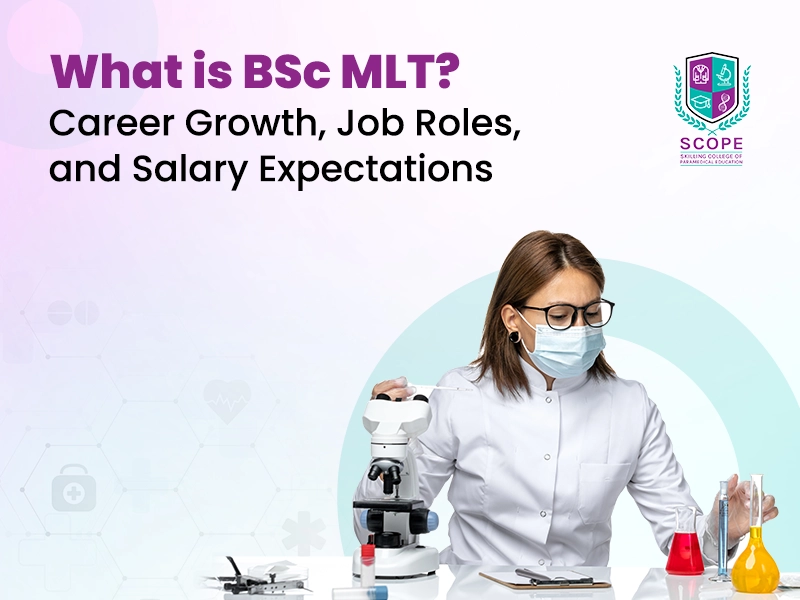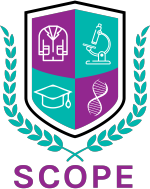
In the ever-evolving healthcare industry, medical laboratory professionals are essential in diagnosing and managing diseases. One of the popular pathways into this field is through BSc MLT, an undergraduate degree program designed to train students in laboratory techniques, diagnostic procedures, and medical testing. In this blog, we will explore what BSc MLT is, its career growth opportunities, job roles, and salary expectations. This information will help prospective students, especially those considering institutions like SCOPE College, understand the scope and potential of a career in medical laboratory technology.
What is the Full Form of BSc MLT?
The full form of BSc MLT is Bachelor of Science in Medical Laboratory Technology. This course covers various laboratory disciplines, including biochemistry, microbiology, hematology, and pathology. Students who complete this program become key contributors to healthcare diagnostics, playing a critical role in providing the data doctors need to make informed treatment decisions.
What is BSc MLT?
What is BSc MLT? It is a specialized undergraduate degree focused on clinical laboratory science. This course equips students with the theoretical knowledge and practical skills necessary to perform medical tests and assist in diagnosing and treating diseases. BSc MLT graduates work behind the scenes, analyzing blood, tissues, and other samples to provide accurate diagnoses for patients. This role is vital in ensuring the accuracy and quality of patient care in hospitals and diagnostic centers.
At institutions like SCOPE College, students are offered comprehensive training in laboratory science to prepare them for a successful career in medical diagnostics.
BSc MLT Course Details: Scope, Duration, and Eligibility
BSc MLT Scope
The scope of BSc MLT is vast and continues to grow due to advancements in healthcare and diagnostic technologies. Graduates of this program can find jobs in hospitals, diagnostic centers, clinical laboratories, and research institutions. With healthcare services expanding rapidly both in India and abroad, the demand for skilled laboratory technologists is higher than ever.
BSc MLT Course Duration
The BSc MLT course duration is three years, divided into six semesters. Each semester provides a balanced mix of theoretical knowledge and practical experience, allowing students to gain hands-on training in medical testing, equipment handling, and diagnostic procedures.
BSc MLT Course Eligibility
To enroll in the BSc MLT course, candidates must have completed their 10+2 education in the science stream, with Physics, Chemistry, and Biology as core subjects. Alternatively, students who hold a Diploma in Medical Laboratory Technology (DMLT) are also eligible to apply.
At SCOPE College, this government-recognized course ensures that students receive quality education and practical training to prepare them for a professional career in medical diagnostics. For more detailed information about the course curriculum, visit the BSc MLT course page.
Career Growth After BSc MLT
A degree in BSc MLT offers numerous career growth opportunities in the healthcare sector. As a medical laboratory technologist, your primary responsibility will be performing diagnostic tests, analyzing samples, and operating advanced medical equipment. Given the increasing demand for healthcare services, career growth in this field is promising.
Initial Career Roles:
- Medical Laboratory Technologist: Perform diagnostic tests and assist healthcare professionals in making informed decisions.
- Pathology Technician: Specialize in examining tissue samples to diagnose diseases.
Mid-Level Career Roles:
- Lab Supervisor: Oversee the daily operations of labs, ensuring that tests are carried out efficiently and accurately.
- Clinical Lab Scientist: Work in advanced roles, managing more complex diagnostic procedures.
Advanced Career Roles:
With further experience and qualifications, BSc MLT graduates can move into senior roles such as:
- Research Scientist: Contribute to medical research by developing new diagnostic tools and methods.
- Healthcare Administrator: Manage laboratory operations in hospitals or diagnostic centers, ensuring quality and compliance in medical laboratory procedures.
For those interested in specialized courses, consider exploring:
- Top Cardiology Courses After 12th
- Nursing Courses After 12th
- Pathology Courses After 12th
- Radiology Courses After 12th
Job Roles for BSc MLT Graduates
After completing BSc MLT, graduates can pursue various roles in medical laboratories, hospitals, diagnostic centers, and research facilities. Here are some of the primary job roles available for BSc MLT graduates:
- Medical Laboratory Technologist: Conduct diagnostic tests and operate laboratory equipment to assist doctors in diagnosing diseases.
- Lab Technician: Assist senior technologists in routine lab tasks and procedures.
- Histotechnologist: Prepare tissue samples for microscopic examination, critical in pathology labs.
- Clinical Lab Scientist: Manage and conduct advanced diagnostic tests, ensuring accurate diagnostic data for healthcare providers.
These professionals are essential to the healthcare system, supporting doctors and specialists in diagnosing diseases and formulating treatment plans.
In the ever-evolving healthcare industry, medical laboratory professionals are essential in diagnosing and managing diseases. One of the popular pathways into this field is through BSc MLT, an undergraduate degree program designed to train students in laboratory techniques, diagnostic procedures, and medical testing. In this blog, we will explore what BSc MLT is, its career growth opportunities, job roles, and salary expectations. This information will help prospective students, especially those considering institutions like SCOPE College, understand the scope and potential of a career in medical laboratory technology.
Salary Expectations for BSc MLT Graduates
The salary of a BSc MLT graduate depends on factors such as experience, location, and job role. Here’s a breakdown of typical salary expectations for graduates:
BSc MLT Salary for Fresh Graduates
Fresh BSc MLT graduates can expect an entry-level salary ranging from INR 20,000 to INR 25,000 per month, depending on the organization and location.
BSc MLT Salary with Experience
With 3-5 years of experience, the BSc MLT salary per month can increase to INR 30,000 to INR 40,000. In senior roles, such as Lab Managers or Research Scientists, salaries can go up to INR 50,000 or more per month.
BSc MLT Salary in India
On average, the BSc MLT salary in India is between INR 2,40,000 and INR 3,00,000 per year for entry-level professionals. However, in major cities or renowned healthcare institutions, salaries tend to be higher, particularly for experienced professionals.
Scope of BSc MLT in India and Abroad
The scope of BSc MLT is not just limited to India, but is growing globally. As healthcare systems expand and diagnostic technologies become more advanced, the demand for skilled laboratory technologists continues to rise. With a BSc MLT degree, graduates can explore employment opportunities both within India and internationally.
In India:
India’s rapidly expanding healthcare sector creates a growing demand for diagnostic services. BSc MLT graduates can find employment in hospitals, research labs, diagnostic centers, and healthcare facilities.
Abroad:
Internationally, BSc MLT graduates are recognized for their technical skills and knowledge. Countries such as the UAE, UK, and US offer attractive job opportunities, with salaries often exceeding INR 1,00,000 per month for experienced professionals.
Why Choose SCOPE College for BSc MLT?
SCOPE College is committed to helping students succeed, offering several key benefits that make it an excellent choice for pursuing a BSc MLT:
Practical Training Focus
At SCOPE College, we prioritize hands-on training, allowing students to gain real-world experience with laboratory equipment and diagnostic techniques. This practical approach ensures students are well-prepared to work confidently in medical laboratories.
Guaranteed Job Placement
SCOPE College offers 100% job placement support to both current students and graduates. This means you can focus on your studies while we help you secure a future in the healthcare industry. Our placement assistance extends beyond graduation, ensuring you are job-ready when entering the workforce.
International Placement Opportunities
Along with local job placements, SCOPE College provides opportunities for global placements, helping students secure positions in top healthcare institutions abroad.
Choosing SCOPE College for your BSc MLT means you are setting the foundation for a successful and rewarding career in medical laboratory technology.
Conclusion: Why Pursue BSc MLT?
If you’re passionate about healthcare and enjoy working in diagnostic laboratories, BSc MLT is an excellent career choice. This degree offers vast opportunities for career growth, a variety of job roles, and competitive salaries. Whether you decide to work in India or abroad, BSc MLT can provide you with a fulfilling and rewarding career in the healthcare sector.
For more information or to enroll in the program at SCOPE College, contact us or enroll now.
FAQ
What is the best job after BSc MLT?
The best job after completing a BSc MLT is typically that of a Medical Laboratory Technologist. In this role, you will be responsible for conducting diagnostic tests, analyzing samples, and assisting healthcare professionals in diagnosing and treating diseases. Other promising roles include Clinical Lab Scientist, Pathology Technician, and Lab Supervisor. With experience, you can also move into senior positions such as Research Scientist or Healthcare Administrator.
What is the scope of BSc MLT in India?
The scope of BSc MLT in India is vast and continually growing due to advancements in healthcare and diagnostic technologies. Graduates can find opportunities in hospitals, diagnostic centers, clinical laboratories, research institutions, and even the private sector. With India’s healthcare system expanding rapidly, the demand for skilled laboratory technologists is high, and the career prospects are promising.
Is NEET required for BSc MLT?
No, NEET (National Eligibility cum Entrance Test) is not required for pursuing a BSc MLT. Admission to the BSc MLT program is typically based on the candidate’s performance in their 10+2 exams, particularly in science subjects like Physics, Chemistry, and Biology. Some colleges or universities may conduct their entrance exams, but NEET is not a requirement for this course.
Is BSc MLT hard to study?
The difficulty of studying BSc MLT depends on a student’s interest and aptitude for science, particularly subjects like biology, chemistry, and medical technology. While the course is rigorous and requires dedication due to its technical and theoretical nature, students who have a strong interest in healthcare and laboratory sciences typically find it manageable and rewarding.
Which BSc course is best?
The best BSc course depends on your interests and career goals. If you are inclined towards healthcare and diagnostics, BSc MLT is an excellent choice as it offers diverse career opportunities in medical laboratories. Other popular BSc courses include BSc Nursing, BSc Biotechnology, BSc Radiology, and BSc Microbiology, each offering its unique set of opportunities in healthcare, research, or industrial sectors.
